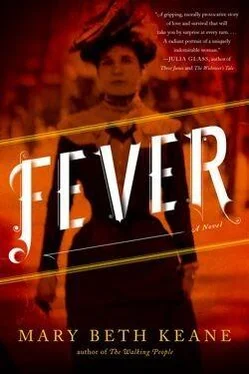“I’m sorry, Mary,” he said after a while.
“I’m sorry, too.”
They spent the rest of the spring catching up. Alfred was driving for the Teamsters and had been selected for training on a motor truck. When he went to work he packed his medicine with the careful attention of a doctor administering to distant patients, fearful of leaving something important behind. Gone was the man who used to send chairs flying back when he stood. When he came home from his shift he rarely went out again after, unless Mary coaxed him to the market or out for a walk. She wrote to Mila to tell her she was safe and that she was sorry if Soper had harassed her after Mary left. She wanted to know if Soper had come for her, if he’d brought police or not, but she didn’t want to send Mila her new address, just in case Soper was monitoring the mail. “Is he allowed to do that?” Alfred asked, when Mary shared her worries.
“I don’t know if he’s allowed. But I know he would if he could.”
She considered going to the Department of Health to explain what had happened, but she knew that no one at the DOH would buy her argument that cooking and baking were different, and now, looking back, Mary admitted she didn’t buy it, either. But no one had gotten sick! Surely, they would have heard rumors at the bakery if Typhoid had broken out among their customers. But Soper would have warned every person at the DOH, and no one there would take her side. The testing would resume. She’d be taken back to North Brother. No, it was not worth the risk.
Their rooms were cheaper than the ones they’d shared on Thirty-Third Street, and Alfred’s wages covered the rent, but Mary wanted to work. She didn’t have the nerve to look into restaurants or bakeries in case Soper was looking for her everywhere, so she began taking in laundry. Their building was meant for single occupants only, and once in a while when she passed a group of neighbors at the mailboxes downstairs she heard them whisper about the couple that was flagrantly flouting the rules everyone else followed. He’d been injured, people heard. Had spent a year in the hospital. Where had she been, all that time? A man’s loneliness is a thing all women understand. An injured man. A working man. What time did he have for himself? Poor thing. But her — where had she come from? What was she after? He was liked, Alfred Briehof. He kept to himself, went about his business. Her? She was standoffish, and she had ideas about herself. Now she was going around mentioning to people that she took in laundry even though she knew full well that there were two other women on the block who also took in laundry. She was never grateful, people decided. Never. A woman could bring her family’s things to any one of the washwomen on the street, and so when she made a selection it was to be expected that the washwoman chosen might offer a cup of tea. A slice of cake. She might knock fifty cents off now and again. Not Mary. She never seemed to care, and if you implied that a shirt collar had not been scrubbed as clean as one would expect, considering the price charged, she struck a wide-legged stance and her face became terrifying.
• • •
Autumn arrived, and a cool mist settled over the city. Hanging over the side of Mary’s basket as she moved through the market were the moppy green heads of carrots, bunched and dirty. She selected potatoes — one for herself, one for Alfred — brushed dirt off their skins, guessed at the depth of the eyes and the black spots she’d carve out with the tip of her knife. Alfred was following her, looking blankly at the stalls, waiting for her to make selections. She cooked supper for herself and Alfred every night, and tried to make those meals as interesting as they could afford. When the Teamsters went on strike, Mary advertised her laundry services more widely, more urgently, and people responded. Her reputation grew. Women showed up with armloads of their husbands’ shirts and Mary stopped bothering to put away the ironing board at night. Alfred was tired now, always tired. He slept in the mornings. He slept in the afternoons. He took his medicine when he woke, and at lunch, and before dinner, and when it was time for bed. The strike ended, and the Teamsters won lunchtime wages. They won Christmas Day. Alfred went back to work.
It was a different kind of life than any they’d had before. There were days when Alfred didn’t feel well enough to drive, and had to take an extra dose of medicine, and they were together more than they were apart. Where before the small space inside their rooms might have pressed in on them, might have made them both as crazy as rabid dogs, now it calmed them. They each had their domains. Alfred stayed mostly in the bedroom, either sitting at the desk or lying on the bed, and Mary stayed mostly in the kitchen. When he came home from work he always went straight to the bedroom to rub his arm and chest with oil, administer the medicine that could be taken only by needle and syringe. When Mary looked in on him to tell him supper was ready, she usually found him curled on the bed, one hand balled under his chin, the other open, palm up, surrendered.
Sometimes he closed his eyes even while he was awake. The light bothered him, he said. Since the fire he had headaches. He had pain in his bowels. He had trouble staying warm. He felt dizzy. The medicine helped all that, but only temporarily.
One day in October 1912, he was driving a truck up to Riverdale when he fell asleep at the wheel and the truck went off the road. He was hauling brick for a stonemason, and though none of the brick was lost, and no one was injured, the company wanted to fire him. The Teamsters got him another job. It happened again — this time he was driving four thousand day-old chicks from Nyack, New York, to the Bronx — and they moved him again. Next time, they warned, he’d be getting a dispatch job. There was only so much they could do. He told them he was sure it would happen again, so they might as well find him the dispatch job, and after that, Mary noticed, he was even more distant, as if he’d lifted a hood over his head and stepped into a shadow.
• • •
On Christmas, they shared a roasted breast of goose and Mary read aloud from the newspaper. At the end of February 1913, Mary bought him a handsome gray wool overcoat to replace the ugly coat he’d bought for himself when he was in Minnesota. He wore the new one for the month and then she packed it away in mothballs for the following year. Spring came, and children appeared on the sidewalk like bulbs that had been planted in the fall and burst through the earth overnight. They shouted and shrieked and threw their balls in the street and dodged traffic and spooked horses while Alfred stood by the window and listened.
Summer came, and on a Sunday in late July Mary convinced him to go with her to the pink granite halls of Pennsylvania Station, where they purchased two tickets to Long Island and spent the day at the beach. She packed a clean sheet for sitting on the sand, a picnic lunch. They walked along the rocks, carrying their shoes, until Alfred got tired. They napped on the sheet before heading back to Manhattan. On the way back to the city, they said how amazing it was that they’d never done that before, that they would certainly do it again before the summer was over. But then the summer became rainy, and when the sun came out again Mary pointed out that train tickets were dear, and then Alfred wasn’t feeling up to it, and next thing they knew it was autumn.
The leaves fell off the trees, and then came another winter, another new year. And then, in late February 1914, Alfred came back from Dr. Tropp’s office looking ashen. He went straight to the bedroom and shut the door.
“What happened?” Mary knocked. He ignored her. When she turned the knob he was standing at the window, hands on his hips.
Читать дальше












